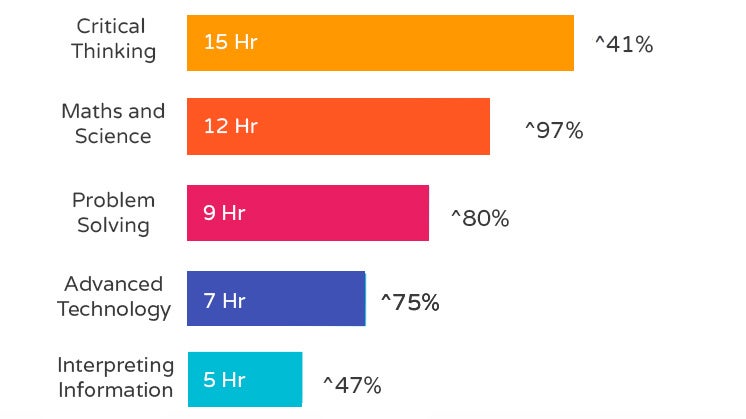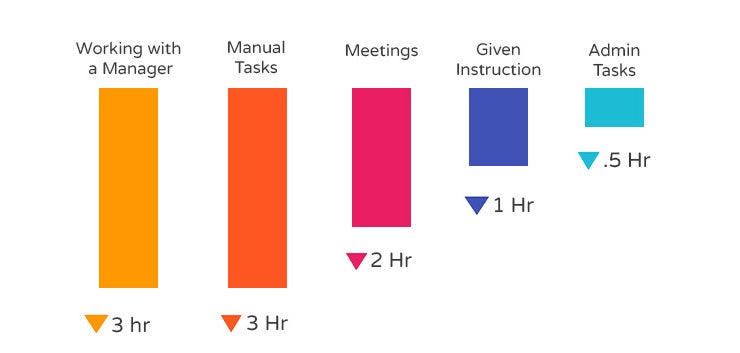The Changing Workplace: Skills Needed by 2030
Instead of focusing on finding the right job, it’s more important than ever to ensure you have the right skills instead, so you can respond to more automated and globalised careers. With more of a focus on technology and less-formal structures; by 2030, you can expect to see a completely different workplace than today’s.
Careers aren’t what they used to be anymore. With thousands of job paths ceasing to exist every decade, it can be hard to determine what careers will have stable job openings in the future. Most university students are studying for a career that won’t even exist by the time they graduate and textbooks are now being replaced yearly, as the content becomes outdated almost as soon as they’re published. Today’s youth are expected to have up to 17 jobs across 5 different career paths over their lifetime, a scale that’s unprecedented.
of the workforce don’t have the IT skills needed for future jobs
more time on the job spent using maths and science skills
more time on the job spent updating skills independently
Flexibility is one of the growing trends in future workplaces, so having the ability to adapt to changes and have the skills that are needed across a wider span of jobs is the key to success. On average, when you train for one job, you acquire the skills for 13 others; so, staying ahead of the changes and retraining is the key to future career success. If, in the future you’re deciding to change careers at 40 or at any age; it’ll help make the transition much easier.
Some short courses can take less than a month to complete, but can give you the competitive edge over competition in sought-after skills in Information Technology, project management or leadership. STEM qualified individuals earn more money than those that don’t, even in industries that aren’t directly related to science, technology, engineering or maths so a course in one of these areas can provide you with skills that are transferable to virtually any workplace.
With such a competitive environment that’s only going to get more intense in the future, it’s more important than ever to get skilled up in the areas that’ll be in demand for many years to come.
What Will the Average Work Week Be Like?
By 2030, the average work week will change dramatically. More time than ever will be spent using information and technology skills, problem solving and interpreting data across virtually every industry.

By 2030, a worker will spend a total of 93 working days every year using their critical thinking skills. As the workplace becomes less structured and less focused on manual tasks; more employees will be involved in decision making processes, working on projects and analysing and monitoring results. Skills in areas of management, leadership and project management will form the basis of most workplaces.
There’s also a significant increase in STEM, or, ‘Science, Technology, Engineering and Maths’ across all industries, as these practices will be seen more often in the next decade, even in industries that don’t usually need these skills.
These Skills Are Already Affecting Employment
Now more than ever, having adequate IT skills is becoming not just a bonus skillset, but a necessity. Michelle Joosse is the CEO of Hotline IT, an IT services company that knows full well the impact employee’s technical skills can have on business in many industries. According to Michelle, ‘Businesses can save money if their staff are IT savvy. Many of the issues that are raised are quite often trivial and would not be issues if the employee of our client’s understood the IT resources they are using. This effects their productivity of the employee’.
IT is such an integral part of any business these days that employees need to know how to use it.
–Michelle Joosse, CEO, Hotline IT
According to a recent survey by PWC, 74% of employees are considering upskilling or retraining completely to remain competitive and adapt to changes in the workplace, especially in areas of technology. This is something that effects all levels of a business as well, not just front-line staff. According to Michelle, Hotline IT deals with ‘non-technical management that make the decisions as to the direction to take with their IT needs. Without this knowledge the wrong decisions can be made which can have devastating outcomes for the business.’
No matter what industry you’re in or looking to be a part of; technology is paving the way for some serious changes to the system. Even high-level management need to be able to adapt and improve their skills to meet a more automated and technological business.
What Careers Will Need to Upskill the Most?
Technology and the changing workplace will affect different careers in different ways, with it boasting opportunities for some and impacting employment in others. Let’s take a closer look at how these can affect popular career paths, and what it might mean for you.
The skills used in the average work week will change, especially for some of Australia’s most popular careers.
Primary and Secondary Teachers

Digital learning tools in the future means teachers will spend less time performing manual tasks like grading and have more time to support students with self-directed learning.
Teaching Skills of the Future
Interaction and Real-World Teaching
Less time spent manually grading means more time with students
Digital Literacy
Plan lessons and resources online
Supporting, Not Instructing
Focus in the future on independent and self-paced learning
Civil Engineers

Engineers will spend more time working with others, managing their own tasks and taking part in crucial decision-making and strategy
Engineering Skills of the Future
Decision Making & Strategy
A push towards self-employment means this skill is more important than ever
Interaction
Engineering will have less management and more time working with other professionals
Project Management
Engineers will be involved with projects more, with less instructions
Health and Welfare Services

Health workers will become more collaborative and rely heavily on communication, critical thinking and continuous learning by 2030
Health Skills of the Future
Critical Thinking
health workers will spend more time making decisions than being instructed
Learning
Continuous and on-the-job learning will be a key part of the work week
Communication
Collaboration and interpersonal skills will form the basis of the health sector
Everyone’s a Leader by 2030
As the workplace becomes more autonomous, leadership and self-paced learning will become more important than ever. Across the board, less time will be spent conducting manual tasks such as data input, filing, cleaning and maintaining equipment. As businesses start to adopt technologies and processes to replace these; the workplace, even in manual-intense jobs like construction, will become more dominated by machines that replace labour.
There’s been a sudden and important shift towards a less-structured management system in Australia, with more employees starting to have more freedom and flexibility in their working lives. From the push towards working from home to flexible work hours starting to become the norm; this is set to continue well into the future.
By 2030, the average work week will see a dramatic reduction in common tasks

Working with a manager will soon become a rarity, with three hours less every week being spent having your work monitored, being instructed and receiving feedback. Skills that have for so long been a central part of any job are being seen less and less every year, with admin and meetings soon to become irrelvent, replaced by technologies that can do these tasks in less time and allow employees to focus on more important aspects of a business.
When you train for one job, you acquire the skills needed for thirteen others
To thrive in this type of environment, you need to have the skills of organisation, time management and the ability to work without being instructed. It’s the perfect environment to develop your own ideas, take part in decision making and improve your expertise by being a bigger part of a business. It’s also perfect for nurturing entrepreneurship and is the driving force behind the increase in self-employment, which is a trend that looks like it’s here to stay for a long time.
The workplace is changing and to keep up with it, we need to change too. In the next 10 or so years, careers will see a huge shift towards self-management, collaboration and a strong focus on digital literacy. Don’t get left behind, stay a head of the competition today and make sure you have the skills to thrive!


